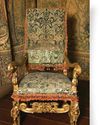
Velvet tells a story as complex and captivating as its plush surface. The genesis of this covetable weave danced from Egypt, around 2000BC, to China, via Baghdad along the way. Small quantities of silk velvet came to Europe before the 12th century, and in significant quantities during the 13th century. This coincided with a time when Genghis Khan’s Mongol Empire brought stability through Central Asia, allowing these textiles to travel down the Silk Road to Europe. The city of Lucca was one of the first to produce silk velvet in Italy, after weavers from Palermo arrived there once the French invasion of Sicily in 1266 had displaced Islamic rule. But it was Venice, and Genoa in particular – whose ports gave access to markets to the East and across Europe – that by the following century were recognised for the quality of their velvets, adapting their weaving traditions and patterns for treadle and draw looms.
The status of silk velvet in these leading Italian city states touched all levels of society, where every aspect of its production was controlled. The wealthy wore it and furnished with it, the dyers who sourced the finest dyes to colour the silk yarn, and the weavers who mastered the technique of producing fabric with pile, were party to secrets not to be shared. One contemporary writer reckoned these secrets were safe anyway, as velvet’s production meant ‘no-one is capable of doing alone the many tasks that it involves’.
This story is from the {{IssueName}} edition of {{MagazineName}}.
Start your 7-day Magzter GOLD free trial to access thousands of curated premium stories, and 9,000+ magazines and newspapers.
Already a subscriber ? Sign In
This story is from the {{IssueName}} edition of {{MagazineName}}.
Start your 7-day Magzter GOLD free trial to access thousands of curated premium stories, and 9,000+ magazines and newspapers.
Already a subscriber? Sign In

Lisa Coppin
The Cotswold Company’s chief creative officer shares the pieces that mean so much to her

TRAVEL
Six of the best pineta, plus a festive trip to Covent Garden. Review of The Orange, Belgravia by Katie Pike, travel stories

OLD SHEFFIELD PLATE
Stumbled upon by chance, this ingenious material was a more affordable option than solid silver, and well-preserved examples are particularly desirable today

Merrily on high
Summoning servants since the 1700s, bell boards create instant English country-house style (even if you don't have any servants). Emma Longstaff dons her pinny

Let it snow
Nostalgic, magical and highly collectable, snow globes are curious objects of wonder that never fail to instil joy

Velvet Crush
Once the preserve of the wealthy, velvet finally touched all levels of society, thanks to advances in its production process

Celebrating in the Stable
Antiques dealer Julia von Hülsen specialises in Gustavian pieces - all of which look perfectly placed in her German home

THE SHOW MUST GO ON
Victorian toy theatres charming and exquisitely designed miniature worlds have inspired theatre royalty for decades. Today, the tradition is being kept alive by a small but talented network of makers

NICHOLAS LEES
The ceramic artist talks to Dominique Corlett about new ways of working with clay and blurring the edges of solid objects

Candy CHRISTMAS
Pastel hues, vintage decorations and bowls of sweet treats: the festive run-up is gloriously joyful at Bettina Færgeman's historic Copenhagen apartment, where there's an emphasis on entertaining...